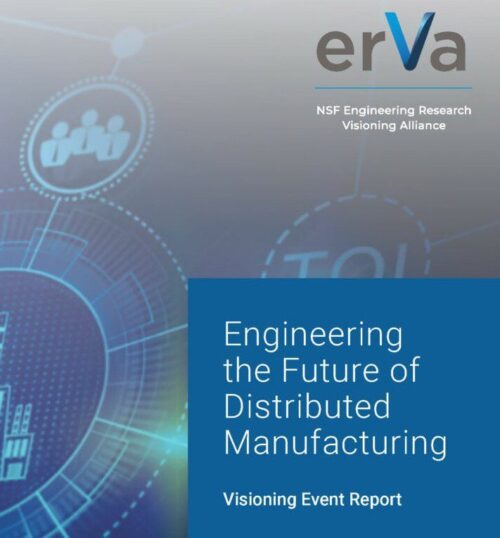New Report Identifies Research Priorities to Revitalize Supply Chain and Manufacturing Sector

Engineering Research Visioning Alliance (ERVA) report offers rapid innovation opportunities to mobilize engineering research to improve productivity, agility, and competitiveness
For five decades, the story of U.S. manufacturing has been one of decline. The United States has slipped from undisputed industrial leader to a secondary player. The challenges—shuttered factories and job losses—are compounded by rising geopolitical tensions with the world’s dominant manufacturer, China. More recently, supply chain disruptions during the COVID-19 pandemic undermined confidence, disrupted commerce, and led to shortages of vital goods. These concerns have spurred increased government investment in the manufacturing sector, but what’s needed is a focus on moving beyond traditional industrial processes to the technologies of the future – ones that will enable facilities to be more widely distributed throughout the country, more secure, self-sufficient and sustainable, and able to produce what the nation needs at a moment’s notice.
That is the impetus behind a new report from the Engineering Research Visioning Alliance (ERVA), an initiative funded by the U.S. National Science Foundation (NSF). The research priorities in Engineering the Future of Distributed Manufacturing are based on a cross-disciplinary visioning session with experts in engineering and manufacturing that met in March 2023. The executive summary and full report can be found on ERVA’s website here.
“U.S. manufacturing needs not just more investment but a new vision and innovative ideas for getting there,” said Charles Johnson-Bey, ERVA co-principal investigator and senior vice president at Booz Allen Hamilton. “We envision engineering research directions that inspire a new generation of workers, excited about the engineering-based potential to increase our capabilities and capacity–a transformed future for distributed manufacturing in which discrete products or tools are produced anywhere, anytime, and in any lot size, enabled by data and with guaranteed quality.”
The report identifies three “grand challenges” that engineers must tackle to bring about a manufacturing transformation: (1) Threats to material supply chains; (2) Inability to create machine tools whenever and wherever they are needed; and (3) The need for improved data and quality assurance. After evaluating the challenges and how they can be addressed, the visioning session experts on five research goals:
- Engineer new, sustainable materials for use in advanced manufacturing;
- Enable new business models that better manage supply chains to build resilience, minimize disruption, and reduce wasted time and materials;
- Design next-generation machines and tools that are small, agile, and reconfigurable;
- Create common, effective, and affordable standards for data collection, analysis, and communication; and
- Develop greater connectivity across the sector and work to eliminate silos.
Many U.S. manufacturing enterprises are small and located in rural areas, with the potential to greatly impact the community’s economic health. The report emphasizes the importance of ensuring that research keeps equity and social impact in mind.
Engineering the Future of Distributed Manufacturing is the sixth report released by ERVA, an initiative funded by the NSF to help identify future engineering research directions. Visit ERVA’s website to visit the previous reports: Engineered Systems for Water Security, Sustainable Transportation Networks Engineering, R&D Solutions for Unhackable Infrastructure, Leveraging Biology to Power Engineering Impact, and The Role of Engineering to Address Climate Change.
ERVA is funded by an the National Science Foundation.
About The Engineering Research Vision Alliance (ERVA):
The Engineering Research Visioning Alliance (ERVA) is a neutral convener that helps define future engineering research directions. Funded by the NSF Directorate for Engineering, ERVA is a diverse, inclusive and engaged partnership that enables an array of voices to impact national research priorities. The five-year initiative convenes, catalyzes and enables the engineering community to identify nascent opportunities and priorities for engineering-led innovative, high-impact, cross-domain research that addresses national, global and societal needs. Learn more at www.ERVAcommunity.org.


